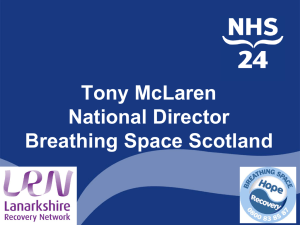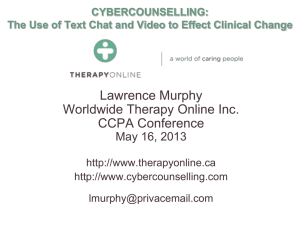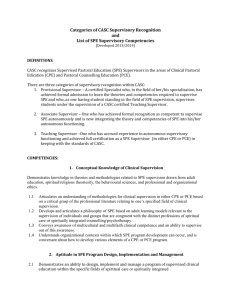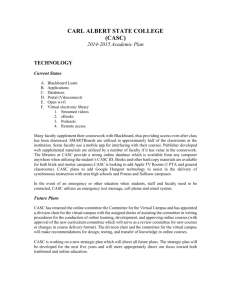Which Spiritual Care Providers Are Exempt From The Ontario
advertisement
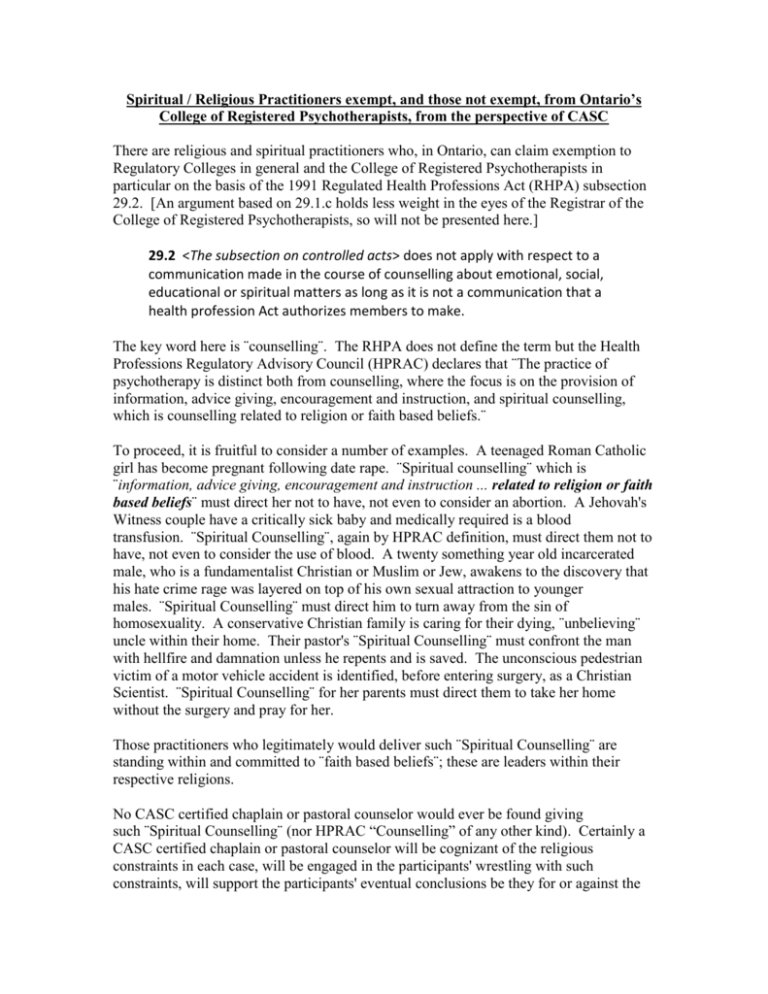
Spiritual / Religious Practitioners exempt, and those not exempt, from Ontario’s College of Registered Psychotherapists, from the perspective of CASC There are religious and spiritual practitioners who, in Ontario, can claim exemption to Regulatory Colleges in general and the College of Registered Psychotherapists in particular on the basis of the 1991 Regulated Health Professions Act (RHPA) subsection 29.2. [An argument based on 29.1.c holds less weight in the eyes of the Registrar of the College of Registered Psychotherapists, so will not be presented here.] 29.2 <The subsection on controlled acts> does not apply with respect to a communication made in the course of counselling about emotional, social, educational or spiritual matters as long as it is not a communication that a health profession Act authorizes members to make. The key word here is ¨counselling¨. The RHPA does not define the term but the Health Professions Regulatory Advisory Council (HPRAC) declares that ¨The practice of psychotherapy is distinct both from counselling, where the focus is on the provision of information, advice giving, encouragement and instruction, and spiritual counselling, which is counselling related to religion or faith based beliefs.¨ To proceed, it is fruitful to consider a number of examples. A teenaged Roman Catholic girl has become pregnant following date rape. ¨Spiritual counselling¨ which is ¨information, advice giving, encouragement and instruction ... related to religion or faith based beliefs¨ must direct her not to have, not even to consider an abortion. A Jehovah's Witness couple have a critically sick baby and medically required is a blood transfusion. ¨Spiritual Counselling¨, again by HPRAC definition, must direct them not to have, not even to consider the use of blood. A twenty something year old incarcerated male, who is a fundamentalist Christian or Muslim or Jew, awakens to the discovery that his hate crime rage was layered on top of his own sexual attraction to younger males. ¨Spiritual Counselling¨ must direct him to turn away from the sin of homosexuality. A conservative Christian family is caring for their dying, ¨unbelieving¨ uncle within their home. Their pastor's ¨Spiritual Counselling¨ must confront the man with hellfire and damnation unless he repents and is saved. The unconscious pedestrian victim of a motor vehicle accident is identified, before entering surgery, as a Christian Scientist. ¨Spiritual Counselling¨ for her parents must direct them to take her home without the surgery and pray for her. Those practitioners who legitimately would deliver such ¨Spiritual Counselling¨ are standing within and committed to ¨faith based beliefs¨; these are leaders within their respective religions. No CASC certified chaplain or pastoral counselor would ever be found giving such ¨Spiritual Counselling¨ (nor HPRAC “Counselling” of any other kind). Certainly a CASC certified chaplain or pastoral counselor will be cognizant of the religious constraints in each case, will be engaged in the participants' wrestling with such constraints, will support the participants' eventual conclusions be they for or against the religious constraints, AND the chaplain or CASC pastoral counselor will bring to bear resources of inquisitiveness, therapeutic listening, reflection and decision making based broadly in psychotherapy, psychology, sociology, anthropology, history, philosophy/ethics, and spirituality/religion (“theology” within Christianity). The base of knowledge and the supervised clinical development required to shift from HPRAC's ¨Spiritual Counselling¨ to CASC certified ¨spiritual care¨ (to utilize a distinct phrase) is the thrust of CASC's Supervised Pastoral Education. The student must learn, experience and evolve to the point of developing and integrating into practice her/his ¨theology of the person¨ and ¨theology of ministry¨ (to use the Christian nomenclature, again other nominclatures being necessary across the interfaith spectrum). CASC is both aware and open to the fact that other ways of formation lead to the same practicing outcome (and hence there are ¨equivalencies¨ and ¨admissions from alternative streams¨ in CASC's standards), but CASC is clear that until a practitioner has developed and integrated the equipment to accompany a person who wrestles with everything including their deepest faith based beliefs, shattering all of it if necessary in order to build something current, grounded, whole and true to self, (until this is possible) the practitioner is uncertifiable and can only practice under clinical supervision leading to certification. It is a certified practitioner (subject to ongoing peer review), CASC contends, who ought to be employed in a hospital, CCAC, hospice, family health team, counselling centre, prison, school, the military or industry in order to attend to the spiritual care of anyoneand-everyone encountered there. In distinction, a practitioner able to do HPRAC's ¨Spiritual Counselling¨ may and must have freedom to practice on the members of their own faith (in line with “the separation of church and state”), but equally must not be thrust upon anyone outside their faith. (Which statement interestingly points to an alternative model historically used in the Canadian Military and in universities; namely, having a ¨chaplain¨ for each different faith group encountered there.) Spiritual care practitioners operating beyond a “counselling”-only scope of practice need (for the protection of the public) to be individuals who, certifiably, have a theoretical and clinically developed base of soul (psyche) care (therapy), and thereby are ¨at home¨ in the College of Registered Psychotherapists. The actual larger ‘professional conclusion of argument’ (by CASC), here, is that spiritual practitioners not belonging to the College and not certifiable by CASC do not belong in Ontario's public institutions providing ¨Spiritual Counselling¨ to the general population, welcomed and supported though they be in giving care to their own faith group members.


